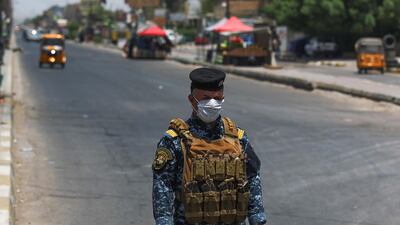Iraq’s decision to extend the lockdown is necessary after a rise in coronavirus infections, the World Health Organisation said on Monday.
Authorities imposed a week-long curfew to curb the latest increase in infections of coronavirus. The country has recorded 6,439 cases of the virus and 205 fatalities since the outbreak started in late February.
“WHO in Iraq is urging Iraqis to follow the instructions of the health authorities to contain the spread of Covid-19 after a rise in infections, stressing that the re-introduction of a complete lockdown in Iraq was a necessary measure in the fight against the virus,” the organisation said a statement.
With a healthcare system depleted by years of conflict and corruption, officials across the country have warned that they are not equipped to deal with a full-blown crisis.
During the holy month of Ramadan the government eased restrictions which resulted in a surge of infected cases, prompting concerns that a second wave might be coming.
Iraqis must commit to the highest levels of preventive measures and adhere to the lockdown, WHO Representative in Iraq, Adham Ismail, said.
Mr Ismail called “the authorities to strictly apply the lockdown measures coupled with intense testing of suspected cases through contact tracing and active surveillance.”
“These measures can only achieve the desired results with the collaboration of all,” he said.
Several districts in Baghdad were put under full lockdown for two weeks in late May after Iraqi authorities warned that the health system cannot handle a rise in coronavirus cases.
Iraq's autonomous northern Kurdistan Region said that a full six-day lockdown will begin from 6pm on Monday, after the region recorded its highest ever day of infection cases.
The health ministry reported that 101 people in Sulaimaniya and Halabja provinces tested positive for the disease.
The cases “include men, women, boys and girls of all ages,” the ministry said in its statement.
All non-essential travel will be prohibited, only medical teams and security forces will be allowed to leave their homes.
Government offices and businesses will be closed but pharmacies will be allowed to open.
Since the start of the holy month of Ramadan, Iraq partially lifted its curfew, which was set between 5pm and 5am local time
Authorities closed the borders with neighbouring Iran, which has seen one of the world's deadliest outbreaks, and banned the entry of foreign nationals travelling from there and other badly affected countries since the outbreak started.
Schools, universities, cinemas and other public spaces were immediately closed.


